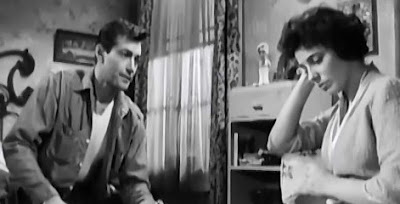 |
| Wynn, Eaton, Kelly, McCallum, Bridges and Thompson |
AROUND THE WORLD UNDER THE SEA (1966). Produced and directed by Andrew Marton. Produced by Ivan Tors.
An increasing danger of undersea quakes that could endanger millions on land causes scientists to decide to implant special sensors in various places on the sea bottom, providing a sort of early warning system. To achieve this Doug Standish (Lloyd Bridges) and Craig Mosby (Brian Kelly) gather a team to occupy their sub, the Hydronaut, and voyage around the world. The team members consist of Hank Stahl (Keenan Wynn), Dr. Orin Hillyard (Marshall Thompson), Dr. Maggie Hanford (Shirley Eaton), and Philip Volker (David McCallum), who agrees to help only if they go on a salvage operation that could net millions once all the sensors are planted. But this operation is interrupted by an eruption, and the crew of the Hydronaut may find themselves in really hot water ...
 |
| Shirley Eaton and Brian Kelly |
Around the World Under the Sea may have been intended as producer Ivan Tors' answer to Irwin Allen's
Voyage to the Bottom of the Sea, but it certainly falls short of providing the same entertainment value. Although there is much talk of the ever-present danger of quakes and the necessity of planting the sensors, there is no sense of urgency and no real suspense until, perhaps, the final sequence. The actors are competent enough for the most part, but not quite up to the challenge in their most intense scenes.
 |
| Lloyd Bridges and Brian Kelly |
Tors filled the movie with such TV stars as Bridges from
Sea Hunt, Kelly from
Flipper, Thompson from
Daktari, McCallum from
The Man from U.N.C.L.E., who affects the same accent he used as Ilya in that series, and then throws in the irascible Keenan Wynn and the sexy Shirley Eaton to cause some minor tension among the boys. Eaton and Thompson seem to be romantically involved at the beginning of the movie, but halfway through she shifts her attention to Kelly, but there's no major reaction from Thompson. Although one could argue that this avoids a cliche -- although there are plenty in this movie -- it also strips the movie of any melodrama, which it could have used. We do get a gigantic eel that shows up and sniffs around the sub, but the problem with this is that it doesn't really seem to be endangering it or the people aboard. (I thought I spotted a few moments of 3D animation during this sequence and stop-motion expert Jim Danson is listed in the credits.)
 |
| David McCallum appeals to Shirley Eaton |
The science of the film is suspect as well. At the climax, the water around the sub should have been boiling from the heat, and other things don't make much sense. However, some viewers might enjoy that Shirley Eaton loses the top of her bathing suit at one point where it floats outside of a porthole (or whatever they call it on a sub), and Harry Sukman's score has its effective moments. The screenplay is not well-constructed and hardly takes advantage of a very workable premise. There is no real characterization to speak of.
Verdict: By no means dreadful, but too blah to be memorable. **1/4.


















